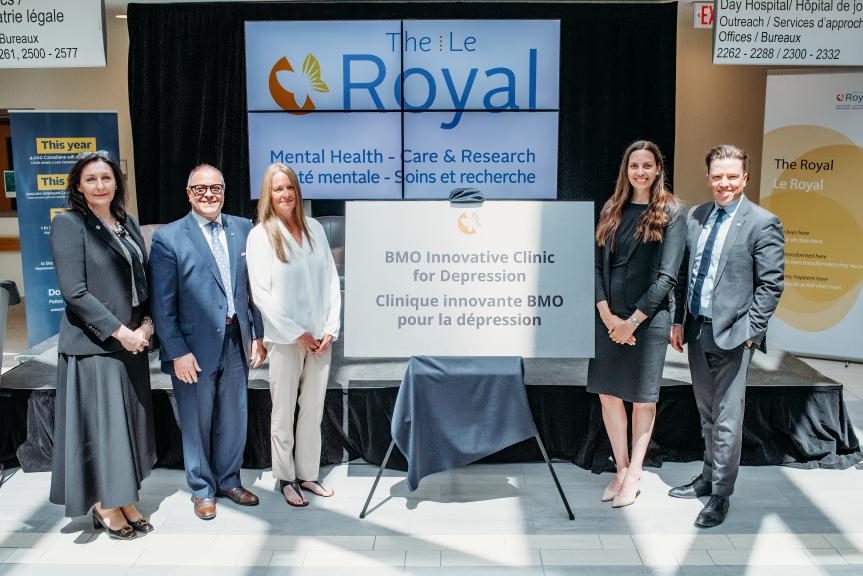According to Health Canada, about 11 per cent of men and 16 per cent of women in Canada will experience major depression at some point in their lives. Of that number, about one third experience difficult-to-treat depression, a clinical designation that means their symptoms do not improve using conventional antidepressant medications.
On May 30, BMO announced a $2 million donation to support the BMO Innovative Clinic for Depression at The Royal. The clinic offers new treatment options, develops research opportunities, and links to other treatments and services within the hospital.

More than many people, Marion Beckett understands the importance of being able to access new treatments for mental health conditions.
Beckett, a former nurse, has lived with depression her entire life. “My mental health story started a long, long, long time ago,” she recalls.
Both of her parents had mental health conditions – her father was not diagnosed until after his retirement and her mother was never officially diagnosed.
In primary school, Beckett says she wasn’t like the other children and describes her childhood self as “sad and anxious.”
“I remember distinctly – even in my grade two classroom – sitting in a circle thinking there's something wrong with me, there were these kids and they're all normal and they had normal families, normal lives, and there's Marion, who’s not.”
Beckett wasn’t officially diagnosed until her early 30s. At that time she was working as a cardiac nurse at an Ottawa hospital. Job-related stress added to personal struggles and eventually, led to a breakdown for which she was hospitalized.
It took two years to find a medication that worked, a period of time Beckett describes as desperate and exhausting.
One of the challenges of mental health treatment is finding a medication that works and has minimal side effects. Unwanted reactions can include weight gain, insomnia, nausea, or fatigue, which can have a negative impact on quality of life and adherence to a treatment plan.
Beckett eventually found a medication that struck the right balance.
“It was not a silver bullet by any stretch of the imagination but I was better than I was, and I was okay,” describes Beckett. “I was good with that. I was much more functional.”
With medication and therapy, she “held steady” until a second mental health crisis in early 2019. A series of tragedies in her personal life led to another hospitalization.
“It took a month to patch me back together,” says Beckett.
This time, when she was discharged she was given the choice to be referred to The Royal.
Beckett’s treatment at The Royal involved esketamine. This form of ketamine has been widely used as an anesthetic for decades and now, thanks to pioneering research from The Royal, it is emerging as an effective treatment for depression.
Esketamine, administered as a nasal spray under medical supervision, was approved by Health Canada in 2020. It targets specific pathways in the brain and increases the brain's ability to make new connections that can support recovery from depression, rapidly reducing depressive symptoms and thoughts of suicide in clients who have failed to respond to other commonly prescribed medications.
The Royal is a national and global leader in this area of research. The first clinical trials of ketamine as a treatment of depression in Canada were conducted at the University of Ottawa Institute of Mental Health Research (IMHR) at The Royal with Dr. Pierre Blier, who had been studying ketamine’s effect on depression since 2010. The outcome of this work was published in 2019 in the American Journal of Psychiatry [https://ajp.psychiatryonline.org/doi/10.1176/appi.ajp.2018.18070834].

“The discovery of ketamine’s antidepressant effects has been hailed as one of the biggest breakthroughs in the field of depression in the past half-century,” says Dr. Jennifer Phillips, lead author and interim scientific director of IMHR at The Royal.
“Research has shown us that esketamine is working for more patients with depression than conventional medications, and working much faster. So people who haven't responded to other treatments, sometimes for several years, might respond to this treatment,” says Phillips.
As a teaching and research hospital, The Royal is able to integrate research directly into the provision of care. This is a key element of the BMO Innovative Clinic for Depression, which will offer novel treatments based on the latest science. Not only does this lead to better outcomes for clients, it creates an environment that helps researchers to answer some big questions around esketamine.
“Esketamine is still new – we're translating it from clinical trials in a research setting into regular care,” says Phillips. “We want to know: Who does this work best for? How can we use this medication to maximize and prolong its effects? And how do we use it in association or conjunction with existing therapies that we might use for depression?”
Beckett’s treatment began in May 2022 and ended in January 2023. Beckett says that while her other medications have kept her stable, she describes the addition of esketamine to her treatment plan as the missing piece of the puzzle.
“The way my brain processes things has absolutely changed,” says Beckett.
She no longer thinks of herself as simply managing – she has her life back.
Beckett hopes the BMO donation inspires other companies to lend their support to similar mental health initiatives: “It really takes leadership to support a cause that has so much stigma around it,” says Beckett.
Victor Pellegrino, regional president, personal banking, Quebec and Eastern Ontario at BMO spoke at the clinic launch event.
“As one of Canada's largest banks, we recognize that mental health is health. We're committed to supporting mental health and wellness organizations and funding ground-breaking medical research that drives real progress for individuals now, and for others in the future,” said Pellegrino, who is also a member of the Royal Foundation’s board of directors.
“What is central to me and to this organization I represent is taking mental health out of the shadows. It needs to be front of the line, we need to talk about it. I'm so encouraged by what I see – not just in this community but across the country and around the world.”
The stigma often associated with mental illness is the main reason why Beckett speaks publicly about her experience.
“The number one way to address the stigma is to just keep talking about it,” says Beckett. “It’s something that gains steam over time, like a snowball rolling down a hill.”
